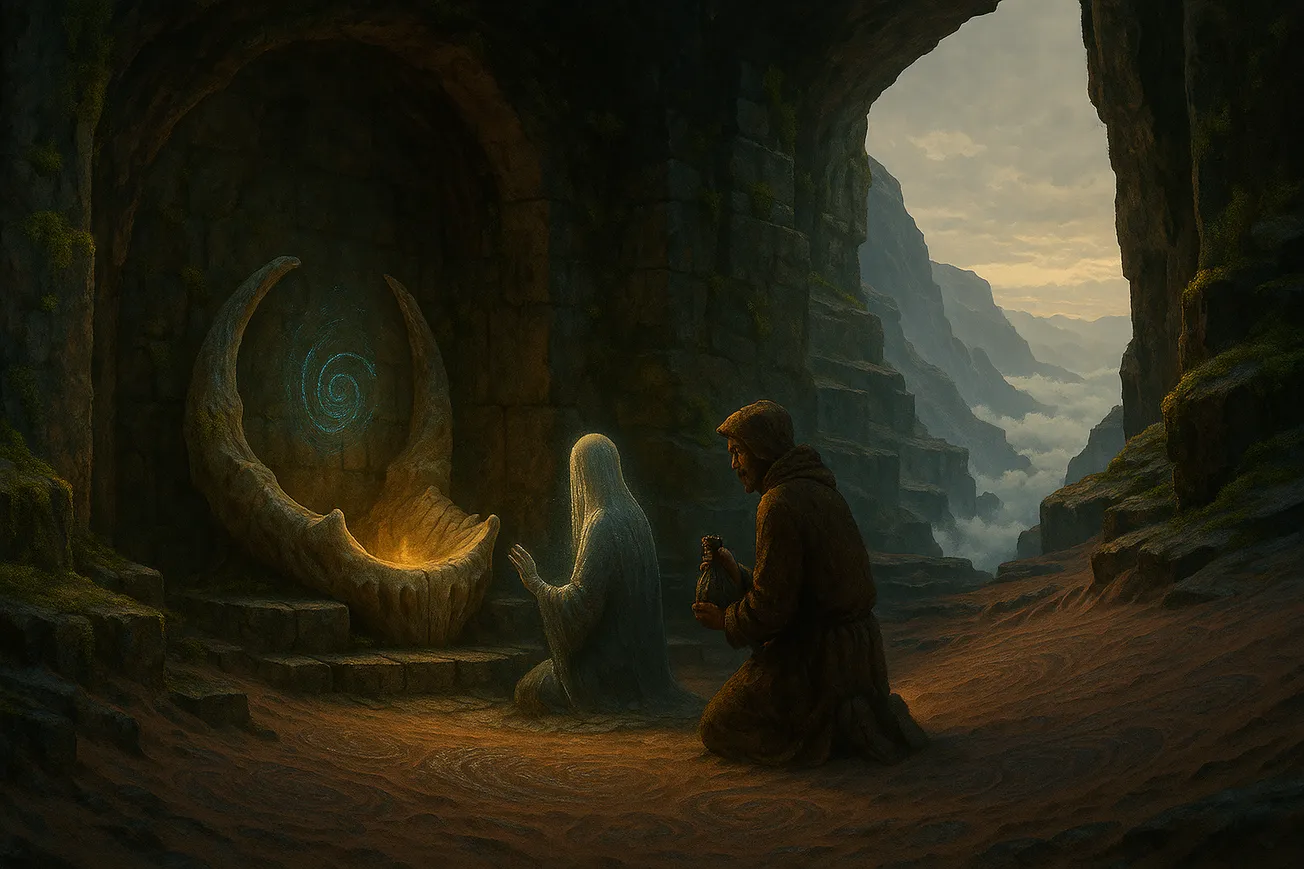🌈 The Fractal Story Engine | Mind & Meaning | (23) MM-005-F2
Each year, the pilgrims climb the basalt terraces of the Plateau of Cedrine, bearing their heaviest remembrances on their backs in cloth pouches sealed with wine-thread. The journey is not marked by milestones or festivals but by a dwindling of personal narrative. By the time one reaches the Chapel of Absents, the story of who they were begins to fragment. This is the tithe.
Within the chapel, moss covers everything but the altar. The altar is bone-white and smooth, shaped like a jaw opened in mid-utterance. The Saint kneels beside it, never speaking. She wears the veil of compound forgetting, woven from the wool of animals who graze on the outer rim of the Forgetting Fields. They eat nothing but erased thoughts, crops that once grew in dream gardens and now sprout as filaments of memory mulch.
When it is your time, you kneel too. You do not confess. You unfasten the pouch and pour the contents onto the altar: smells, pulses, faces, doors that locked behind you. Not facts. Sensory anchors. Then you place your head on the altar and close your eyes.
You will hear two breaths. Yours. And another, ancient one, pulled from a place beneath sound. The Saint does not touch you. She breathes through the veil and into the room’s ribs. The memories begin to unravel like spools left in rain.
Vassan came with a different intention. He did not kneel. He laid nothing down. Instead, he brought a question wrapped in burlap and soaked in river clay, strapped to his spine with vine-thread. He did not want to forget. He wanted to find out who had taken from him something he could no longer name. He remembered a woman’s hand, and a sequence of notes hummed in an unlit stairwell, and nothing else. He followed that absence until it led to Cedrine.
He stood in the Chapel of Absents for seven days without sleep. The Saint never acknowledged him. Others came and left, the room filling and draining like a lung. On the eighth day, when his eyes crusted with memory-dust and his knees no longer obeyed, he whispered into the veil of the Saint.
“Was I erased?”
For the first time in recorded chapel history, the Saint tilted her head. She extended one finger toward the bone altar.
Vassan followed it.
There, burned faintly into the curve of its edge, was a song. Not words. Not notation. Just heat-etched resonance, the kind a reed makes when struck by grief.
He touched it.
The air went out of the room. He fell.
When he woke, he was beneath the chapel, in the root-chamber, where vines swallow the foundations of time.
The Saint sat opposite him. Her veil was gone. Her face was no face. Only glimmering pulse.
“Why did you come?” asked the voice, though no mouth moved.
“I think I lost someone I loved.”
“No,” the voice said. “You were made as a repository. Someone placed their grief inside you. That song was not yours. It was the key they used to lock their sorrow in you.”
“Who?”
“Someone who could not bear to carry it anymore.”
“Did they erase me after?”
“No,” said the Saint. “They left you full. They only removed themselves.”
Vassan stayed at the chapel. He did not climb back down the terraces. He did not sing. He did not age. Instead, he waited. Not for answers. For the faint return of the grief that did not belong to him. Each time a pilgrim arrived, he watched their eyes. Some glinted with familiar absence.
One day, a girl came with no pouch. Just a flute carved from a hollow tooth.
She played a note that cracked the altar.
Vassan stood.
She looked up and wept, though she did not know why.
Neither did he.
But something had begun again.

